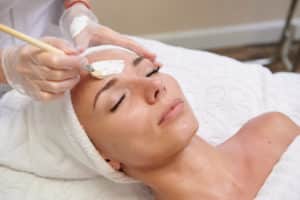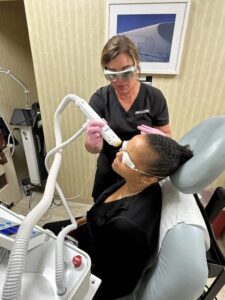Dermatologist vs Esthetician: What’s the Difference and Who Should You See?
If you’re looking to improve your skin—whether it’s clearing up acne, softening fine lines, or getting your glow back—you might be wondering:
Should I see a dermatologist or an esthetician?
The truth is, you don’t always have to choose. Dermatologists and estheticians often work together—and when they do, patients tend to get the best results.
Here’s what you need to know to make the right decision for your skin care goals.
Schedule a consultation with our dermatologist or esthetician here!
Dermatologists and Estheticians: Two Skin Experts, Different Roles
Dermatologists: Medical Experts in Skin Health

A dermatologist is a medical doctor (MD or DO) who specializes in diagnosing and treating conditions related to the skin, hair, and nails. They handle everything from acne and eczema to skin cancer, and they also provide advanced cosmetic treatments like Botox®, microneedling, and laser therapy.
Because dermatologists are physicians, they:
-
Can diagnose medical conditions
-
Can prescribe medications
-
Perform in-office procedures
-
Bill insurance for medically necessary treatments
- Recommend skin care and hair care
They also offer evidence-based skin care guidance—which means their product recommendations are based on what’s safest and most effective for your specific diagnosis.
Estheticians: Licensed Experts in Skin Appearance and Maintenance

An esthetician (sometimes spelled “aesthetician”) is a licensed skin care professional who performs cosmetic treatments to improve the look and feel of the skin. Think facials, superficial chemical peels, extractions, and skincare product recommendations.
While estheticians do not diagnose or treat medical conditions, they can:
-
Support skin health with non-invasive treatments
-
Enhance your results with services like hydrating facials or acne-safe extractions
-
Help you stay on track with your routine and self-care goals
Their training focuses on skin beautification, and their services are often relaxing and affordable—but they can’t provide medical care.
Do You Have to Choose One or the Other?
Not at all. In fact, it’s often better when you see both.
At Aglow Dermatology, we believe in collaborative skin care. That means medical and cosmetic professionals working side by side to give you the most personalized, effective treatment plan possible.
For example:
-
If you’re struggling with acne, a dermatologist will evaluate your skin and prescribe a treatment plan. Once your acne is under control, your doctor might refer you to an esthetician for facials, laser, or gentle peels that reduce post-acne marks and prevent future breakouts.
-
If you have a suspicious mole, or are concerned about skin cancer, you should see a dermatologist.
-
If you are interested in laser hair removal, you could see either.
-
If you’re interested in a glow-up but have sensitive skin or rosacea, a dermatologist can clear you medically, then recommend appropriate esthetic treatments that are safe and effective for your condition.
-
If you want to start a skin care routine but don’t know where to begin, an esthetician can walk you through basic care—then refer you to the dermatologist if anything looks suspicious or beyond cosmetic.
When both providers work together, you get safe, thoughtful, and complete care. You don’t waste time, money, or skin barrier trying the wrong thing.

Common Skin Concerns: Who Should You See?
If you’re unsure where to start, here’s a quick guide:
See a dermatologist if you:
-
Have acne, eczema, hair loss, or a rash
-
Need a diagnosis or prescription
-
Want Botox®, microneedling, or laser treatment
-
Want medical advice on ingredients like tretinoin or hydroquinone
See an esthetician if you:
-
Want a facial or glow-boosting treatment
-
Need help building a basic skincare routine
-
Want extractions, a light peel, or a relaxing self-care session
-
Have a dermatologist-approved condition and need cosmetic support
See both if you:
-
Have acne and want both medical treatment and cosmetic support
-
Are building a long-term skin care plan with both prevention and pampering
-
Need help staying consistent with treatments and product use
Can Estheticians Bill Medical Insurance for Extractions?
No. Some procedures that an esthetician is allowed to do, such as extractions or chemical peels for acne, are covered by some insurance plans. For health insurance to pay, however, these treatments must be performed by licensed health professionals (e.g., physicians, physician assistants, or nurse practitioners).
Can Estheticians Do Botox?
No. Botox® and other injectable procedures are medical treatments (technically drugs) that must be performed by licensed health professionals (e.g., physicians, physician assistants, or nurse practitioners). Estheticians cannot legally inject Botox or fillers, even in medical settings.
What About Medical Estheticians?
You might hear the term “medical esthetician”, especially in dermatology or plastic surgery offices. While this isn’t a separate license, it usually refers to an esthetician who works in a clinical setting under the supervision of a physician. These estheticians are often trained in advanced treatments and protocols—but they still don’t diagnose or treat medical issues independently.
At Aglow Dermatology, our medical estheticians work directly with board-certified dermatologist Dr. Dina Strachan to deliver safe, effective, team-based skin care.
A Quick Note on Training
Just for context:
-
Board-certified dermatologists complete 12+ years of training, including medical school and residency, totaling more than 20,000 hours. They must maintain board certification and stay current through continuing education.
-
Licensed estheticians typically complete 600–1,200 hours of training (depending on the state), plus pass a licensing exam. Many gain further experience on the job, and their skills often reflect the type of setting they work in—like a spa vs. a medical office.
Both professionals must be licensed in the state where they practice. In New York, for example, estheticians may not perform deep chemical peels or microneedling that penetrates the skin unless working under physician supervision. Similarly, lasers are considered medical devices, so estheticians can only use them in licensed medical facilities and under physician oversight.
Final Thoughts: The Best Skin Care Is Collaborative
Choosing between a dermatologist and an esthetician doesn’t have to be an either/or decision. When dermatologists and estheticians work together—as we do at Aglow Dermatology—you benefit from a complete circle of care: medical expertise, cosmetic support, and continuity that meets your needs at every stage of your skin journey.
Whether you’re treating a condition, maintaining a glow, or both—let your skin care team work as a team.


